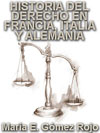
HISTORIA DEL DERECHO E HISTORIOGRAFÍA JURÍDICA CONTEMPORÁNEA EN FRANCIA, ITALIA Y ALEMANIA
María Encarnación Gómez Rojo
Esta página muestra parte del texto pero sin formato.
Puede bajarse el libro completo en PDF comprimido ZIP (371 páginas, 1.38 Mb) pulsando aquí
[Nº 274] Carta de Emilio Bussi, profesor emérito de Historia del Derecho Italiano de la Universidad de Modena, a Manuel J. Peláez
Roma, 24 de mayo de 1989
Illustre Collega e carissimo Amico!
con molto piacere aderisco alle Tabulae Gratulatoriae in onore dei due Colleghi Josep Maria Font i Rius nonché Jesús Lalinde Abadía che hanno onorato coi loro fondamentali lavori la scienza storica e giuridica della loro bella Patria.
Sarò molto felice di apparire tra coloro che hanno loro reso omaggio. Colgo la occasione per comunicarLe che ho ricevuto le due copie del volume nel quale è contenuto il mio articolo sull’Allgemeines Landrecht der preussischen Staaten.
Il volume è riuscito molto bene e mi rallegro con Te.
Non sono arrivati ancora tuttavia gli estratti: forse sono ancora in viaggio!
Caro Peláez la presente Ti porta il mio ringraziamento ed i mei voti di ottime cose.
Con tutta cordialità, Tuo
Emilio Bussi (firmado)
Archivo del Grupo de Investigación de Historia de las Instituciones Jurídicas, de los Sistemas Políticos y de las Organizaciones Sociales de la Europa Mediterránea, L-825/89.
[Nº 275] Carta de David J. Langum, profesor de la Cumberland School of Law de la Samford University, a Manuel J. Peláez
Birmingham (Alabama), 24 de mayo de 1989
Muy apreciado amigo:
Muchas gracias por el libro y las separatas. Parecen muy interesantes. Recibí hace tres semanas, pero no pude escribir antes de ahora a causa de la calamidad académica más grave: la necesidad de calificar los exámenes.
Incluido mi reciente libro sobre la ley mexicana, 1821-1846, en California y la relación de esa ley a los inmigrantes americanos. En el libro es fondo breve respecto a la ley española, 1769-1821, en California.
De nuevo, gracias. ¿Cuándo aparecerá nuestro libro?
Suyo affmo.,
David J. Langum (firmado)
Archivo del Grupo de Investigación de Historia de las Instituciones Jurídicas, de los Sistemas Políticos y de las Organizaciones Sociales de la Europa Mediterránea, L-826/89.
[Nº 276] Carta de Ph. J. Thomas, profesor del Departamento de Historia del Derecho, Derecho Comparado y Filosofía del Derecho de la Universidad de Pretoria, a Manuel J. Peláez
[Pretoria], 25 de mayo de 1989
Dear colleague,
I refer to your letter dated 5 May 1989.
The Faculty of Law of the University of Pretoria offers various law degrees of which the most important is the LLB degree. Furthermore the B Proc, B Iuris, B Com (Law) degrees can be obtained at our university. As a result of the various degrees, varying requirements and standards do apply.
In respect of your question the relevant courses of Roman Law and Legal History are compulsoty for all degrees, but in Roman Law a distinction is made between Roman Law 101 and Roman Law 102. Roman Law 101 is compuylsory for the LLB degree and is offered in the second study year. However, a limited knowledge of Latin is a prerequisite for this course, which the result that a number of students only follow the course in their third year, having failed the preliminary Latin requirement. The curriculum of the course entails a brief survey of Roman legal history, law of procedure and the Roman private law. It is a year course of 5 (40 min.) lectures per week and texts from the Corpus Iuris Civilis form part of the course. On the other hand, Roman Law 102 is a more elementary course. Althought the curriculum reads the same, no Latin is required and it is a rule a first year course.
In their final year LLB students have the option of choosing Roman Law 500 as a subject. In this course a selected topic will bew analysed in the texts and its development followed from the glossa until codification in the Netherlands. The accent falls on method, available aids, sources etc. rather than on the material law of the chosen topic.
Legal History is a third year course for all law students. It contains a survey of the external legal history of Western Europe until the twentieth century and South Africa until today. The second component is made up by capita selecta from ancient or more recent legal history.
Since South African law is not codified and Roman-Dutch law forms an integral part of South African private law, the study of Roman Law is required by legislation as a requirement for the legal professions. However, the Latin requirement is rather watered down and may soon be abolished.
I hope this information will be useful to you.
Yours sincerely
Ph. J. Thomas (firmado y rubricado)
Archivo del Grupo de Investigación de Historia de las Instituciones Jurídicas, de los Sistemas Políticos y de las Organizaciones Sociales de la Europa Mediterránea, L-827/89.

